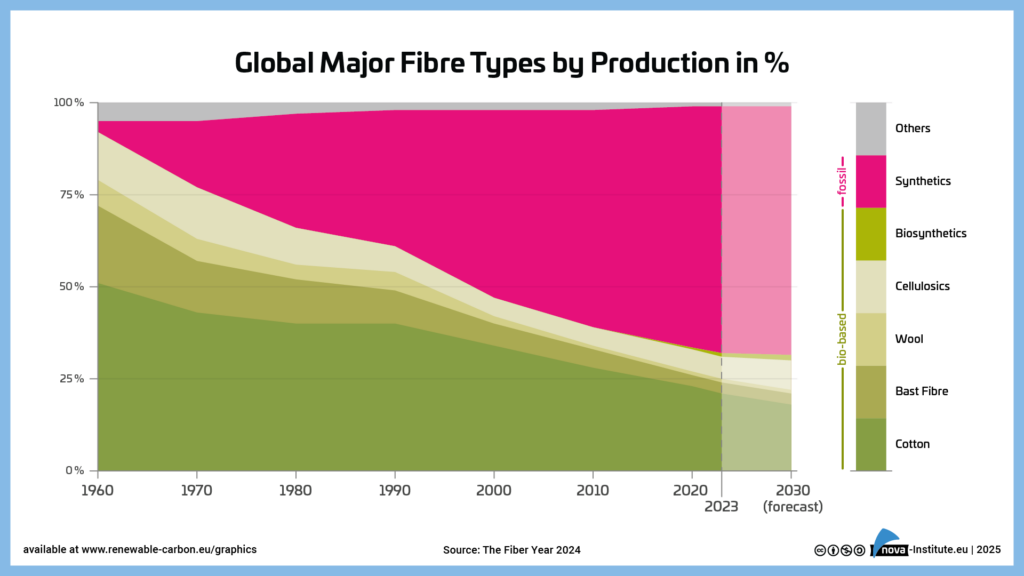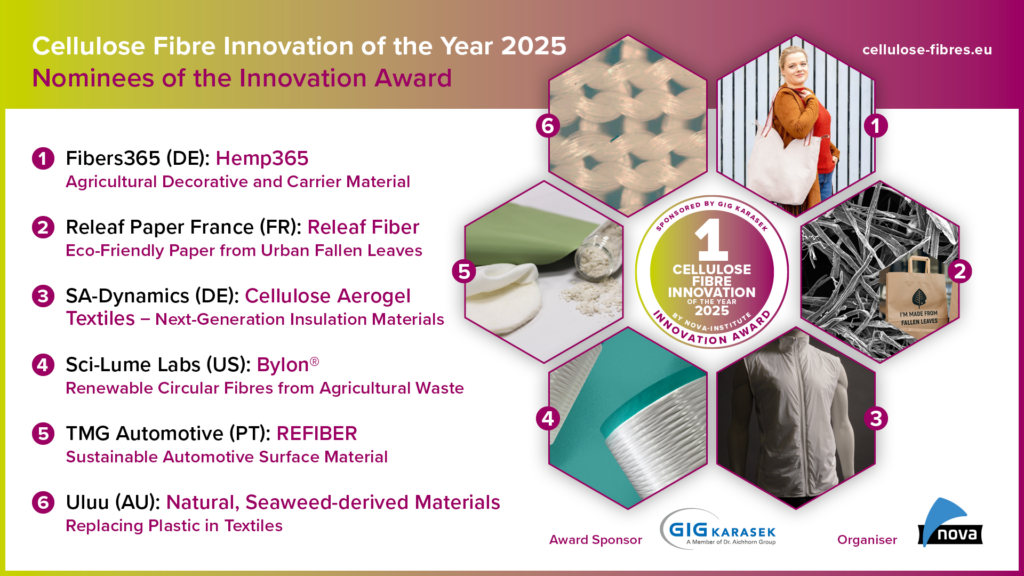
The conference program is ready, the innovation award nominees are excited and all sponsors, media partners and partners are spreading the message diligently. Conference organiser nova-Institute is looking forward to welcoming over 200 expected participants on-site in Cologne, or online. The two days are packed with presentations, lively panel discussions and networking. There will also be an exhibition and a special poster exhibition. A new matchmaking tool helps with the uncomplicated arrangement of 1:1 meetings.

Sustainable Textiles – The Way Forward
The evolution of the demand for textile fibres from 1960 to the present day (see figure 1 and table 1) shows how the textile industry found itself in this dilemma. In 1960, around 95% of textile fibres were of natural origin, from bio-based carbon, and there was no problem with microplastics, all fibres were biodegradable. The explosion in demand – 650% between 1960 and 2023 – could only be met by synthetic fibres from the chemical and plastics industries. Their share grew from 3% in 1960 to 68% in 2023 and from less than 700 tonnes to 85 million tonnes/year (The Fiber Year 2024). The new fibres covered a wide range of properties, could even achieve previously unknown properties and, above all, thanks to a powerful and innovative chemical and plastics industry, production volumes could be rapidly increased and comparatively low prices realised.
Find out more: https://renewable-carbon.eu/news/sustainable-textiles-the-way-forward/
Biosynthetics on the rise
This year, nova has added a new subject area. Besides cellulose fibres, bio-based polymer fibres (“biosynthetics”) are an excellent option to reduce fossil fibres in textiles. Biosynthetics offer a powerful alternative to traditional synthetic fibres, bringing both performance and technical properties that make them drop-in replacements. Derived wholly or partially from natural, renewable sources like lactic acids, sugar beet, sugarcane or wood, biosynthetics represent a bio-based option compared to fossil-based counterparts. In a special session “Biosynthetics – Replacing Traditional Synthetic Fibres”, experts will explore the latest advances, challenges and opportunities in the field. Discussing innovative approaches like biosynthetics is essential to drive sustainable transformation within the fashion and textile industries.
Find out more: https://renewable-carbon.eu/news/bio-synthetic-well-which-is-it/
Fibre-to-Fibre Recycling: A Path to a Sustainable Textile Industry
A hotly debated topic: Fibre-to-Fibre Recycling. The textile industry is at a crucial crossroad. The need for sustainable solutions to meet the EU’s ambitious climate change targets is becoming increasingly urgent. Fibre-to-fibre recycling, which transforms discarded textiles into new, virgin fibres, holds great promise for reducing waste and resource consumption and helps to close the loop in textile production. While Europe has made progress in this area, challenges remain – in particular the management of mixed fibre textiles and the scaling up of recycling technologies. As new approaches are needed to tackle climate change, one session of the conference will focus on fibre-to-fibre recycling from textiles, exploring the latest innovations and technological advances, as well as the opportunities and barriers that need to be addressed to move the industry towards a circular, sustainable future.
Fibre Microplastic Formation versus Marine Biodegradability
The environmental impact of textiles extends far beyond landfill, with microplastics from synthetic fibres becoming a growing concern in marine ecosystems. A session at the conference will focus on the complex relationship between microplastic formation and marine biodegradability. While synthetic fibres shed microplastics during washing, these tiny particles, known as microfibres accumulate in the oceans and pose a serious threat to marine life. This session will explore the factors that influence fibre degradation in the marine environment and examine the potential of biodegradable fibres to reduce long-term pollution. Leading research institutes will discuss the challenges of balancing the prevention of microplastics with the development of fibres that can degrade naturally in marine ecosystems, and provide insights into innovative solutions that could help mitigate this pressing environmental issue.
Innovation Award “Cellulose Fibre Innovation of the Year 2025”
The nova-Institute, together with GIG Karasek, is looking for the best fibre innovations of the year. Six applicants from the area of cellulose fibres as well as biosynthetics are nominated. The innovation award “Cellulose Fibre Innovation of the Year 2025” is sponsored by GIG Karasek.
Find the nominees for the “Cellulose Fibre Innovation of the Year 2025” award here: cellulose-fibres.eu/award-application
Poster Exhibition
The poster exhibition is a highly anticipated scientific event at the conference, especially for early career scientists. Take a look in advance: cellulose-fibres.eu/posters/
The program and all information on registration, sponsoring and exhibition is available on cellulose-fibres.eu
Sponsors
The Cellulose Fibres Conference 2025 is sponsored by: GIG Karasek (Innovation award), Birla Purocel, List AG, Valmet and Dienes.
Source
nova-Institute, original text, 2025-02-27.
Supplier
Birla Cellulose
Dienes Apparatebau GmbH
Europäischer Wirtschaftsdienst GmbH (EUWID)
Fibers365
GIG Karasek GmbH
List AG
nova-Institut GmbH
Releaf Paper
SA-Dynamics
Sci-Lume Labs
The Fibre Year Consulting
The Green Chemicals Blog
TMG Automotive (PT)
Uluu (AU)
Valmet
Share
Renewable Carbon News – Daily Newsletter
Subscribe to our daily email newsletter – the world's leading newsletter on renewable materials and chemicals











